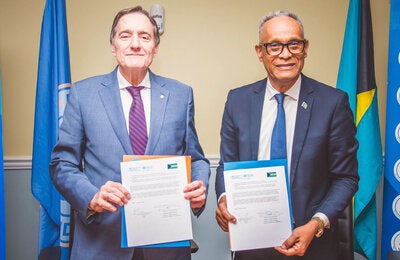
17 July 2013 (WHO)—An Emergency Committee convened by WHO's Director-General under the International Health Regulations (IHR) to assess the Middle East Respiratory Syndrome coronavirus (MERS-CoV) situation today unanimously decided that conditions for a public health emergency of international concern have not yet been met. Director-General Dr. Margaret Chan agreed with the Committee's advice that the situation is of great concern, although it does not constitute a public health emergency at this time.
The second meeting of the Emergency Committee convened by the Director-General under the International Health Regulations (2005) [IHR (2005)] was held by teleconference on Wednesday, 17 July 2013, from 12:00 to 16:04 Geneva time (CET).
In addition to Members of the Emergency Committee, an expert advisor to the Committee1 participated in the meeting. During the informational session of the meeting, several affected States Parties were also on the teleconference. The States Parties on the teleconference were: France, Germany, Italy, Jordan, Kingdom of Saudi Arabia, Qatar, Tunisia, and the United Kingdom.
The Committee reviewed and deliberated on information on a range of aspects of MERS-CoV, which was prepared or coordinated by the Secretariat and States in response to questions presented by Members during the first meeting.
It is the unanimous decision of the Committee that, with the information now available, and using a risk-assessment approach, the conditions for a Public Health Emergency of International Concern (PHEIC) have not at present been met.
While not considering the events currently to constitute a PHEIC, Members of the Committee did offer technical advice for consideration by WHO and Member States on a broad range of issues, including the following:
- Improvements in surveillance, lab capacity, contact tracing, and serological investigation
- Infection prevention and control and clinical management
- Travel-related guidance
- Risk communications
- Research studies (epidemiological, clinical and animal)
- Improved data collection and the need to ensure full and timely reporting of all confirmed and probable cases of MERS-CoV to WHO in accordance with the IHR (2005).
The WHO Secretariat will provide regular updates to the Members and will reconvene the Committee, in September, on a date to be determined. However, serious new developments may require an urgent re-convening of the Committee before then.
Based on these views and the currently available information, the Director-General accepted the Committee's assessment that the current MERS-CoV situation is serious and of great concern, but does not constitute a PHEIC at this time.
The Director-General expressed her gratitude to the Committee on its wide range of advice on health actions for countries to implement and advise on follow-up work by WHO.



